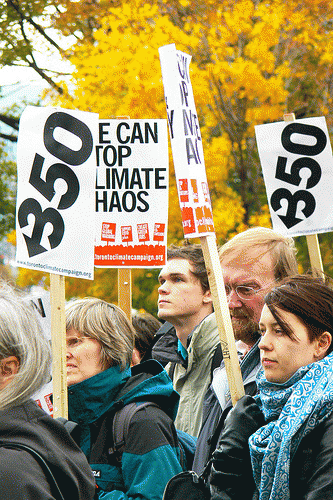
International Day of Climate Action - Toronto Chapter goes positive.
(Image by Tania Liu) Details DMCA
Re Climate Action: "Protect & Prevent" or "Make War & Control"?
by Susan C. Strong
Right now we're on the home stretch for Election 2016. Donald Trump has recently announced that if elected he would select a climate denier as EPA head. (If Pence replaces him at the top of the ticket, we can be sure he'd do the same.) We're also on the home stretch for doing anything effective about the climate chaos ahead. The climate stakes in this election couldn't be higher. So we need to be very strategic about how we talk about it (not just how we vote). The question we must all take very seriously now is what framing will work to move us all in the right direction. It's not enough to reach "the choir" on this point or to focus on the deniers. The challenge is to get a majority of Americans on board for doing what's needed. That's what helps a president the most.
Now many of my readers will have read Bill McKibben's article from the August 2016 New Republic, entitled "A World at War." In it he argues that we need a rapid "war" style mobilization of all our resources to make our society emission-free. The rest of his piece is directed at a President Hillary Clinton, spelling out how she could do what's required by executive order, just as FDR did in the 30's. Of course, he admits that FDR had a Congress he could work with and a war that everybody could see was indeed a war, and no mere metaphor.
Of course McKibben is right that the crisis is real and radical steps are needed. The question is: what story and what framing of this issue will help Madam President get it done, in a situation very different from the one FDR faced? No president can move forward very far or fast without deep popular support. Much as I deeply respect and admire Bill McKibben, his expertise lies in areas other than framing for the merely persuadable. By this time the public has a fully justified suspicion of any more "war on x" metaphors, given what we know now about Nixon's "war on drugs," and Bush's deceptive "war on terror. Moreover, most Americans don't like proposals based on the idea of "control." And in an ill-fated attempt to make the climate crisis more graphic, McKibben describes the enemy in his "war" scenario as the disembodied "laws of physics."(1) More despair and disempowerment potential there--how can we puny humans possibly "defeat the laws of physics?" (A folk story would work better here: how about the Sorcerer's Apprentice?) Even more to the point, the deepest source of elite climate denial comes from knowing that fighting climate change would require exactly the kind of federal takeover and regulatory regime McKibben suggests. That is the one thing they are all most firmly against. Handing them a weapon like the "war "metaphor is fatal.
What to do about framing this
issue for the general public? A great deal of excellent research has been done
over the last decade about what framing actually works for this issue. Again
and again, the most powerful frames are positive: "protecting our families and children, preventing damage," and "economic recovery through new, clean energy
jobs." Clean energy is something
all Americans want. (Please see online links for my sources in note (2) below.)
We can also speak of climate action as a form of insurance and financial
responsibility, which will increase our energy security too. (See note 3 below for a remarkable success
story using the insurance metaphor.)
Powerful visual stories of how we could switch to a clean energy economy and
reap huge benefits also exist. Charles Ferguson's 2015 film, Time
to Choose and Leonardo Di Caprio's forthcoming one, Before the Flood, in theaters 10.21.
and on the National Geographic channel on 10.30 come to mind. They say, and you need to say, "This is our
biggest innovation challenge, an American 'can do' test, and we can 'meet it if we really try.'"
With the Paris Accords now in force, the rest of the world is racing
ahead on these goals. It's past time we really "got in the game" too.
All the frames I've mentioned above allow us to start talking about the problem
in much more accessible ways. And talking
about the problem more is what's needed, according to the Yale Program on Climate
Communication. Their
study shows that the most fundamental reason people continue to think the problem
is no real problem is that "no one is talking about it." And we will never get
enough buy in to make the kinds of changes McKibben rightly says we need
without a much more broadly activated American public, ready to apply the
pressure all presidents need to actually move their agendas.
So let's make it easier for Madam
President to go in the direction we must. Let's use the words that will
increase support. Protecting, preventing, creating clean energy and local jobs, and
being financially responsible can be
"urgent" too. Meeting this big innovation
challenge is an American 'can do'
test we can 'meet it if we
really try. It really is time we "got in the game" And it's a proven
fact that Americans tune out if we just scare them. We have to give them something
positive to aim for instead.
------------------------------------
Susan C. Strong, Ph.D., is the Founder
and Executive Director of The Metaphor Project, http://www.metaphorproject.org, and author of our book, Move Our Message: How to Get America's Ear.
The Metaphor Project has been
helping progressives mainstream their messages since 1997. Follow Susan on Twitter @SusanCStrong and check out her TEDx talk too.
------------------------------------
(1) McKibben's actual phrase was: "The question is not, are we in a world war?
The question is, will we fight back? And if we do, can we actually defeat an enemy as powerful and inexorable as the
laws of physics?" [Emphasis mine].
(2) The best climate action framing guides
can be found at:
https://grist.org/climate-energy/heres-everything-we-know-about-how-to-talk-about-climate-change/
http://ecoamerica.org/wp-content/uploads/2015/11/eA-lets-talk-climate.pdf
http://climatecommunication.yale.edu/publications/climate-spiral-silence-america/
(3) The "insurance" tactic can be especially useful in talking to on-the-fence
or somewhat resistant conservatives you already know. Living Room Conversations
co-founder Joan Blades discovered that a long-time conservative colleague of
hers was actually persuaded by her saying that she was herself a conservative
in the traditional sense of the word, and that she "didn't want to take chances
with the future--even a 10% chance
that we are undermining the capacity of our planet to support future generations
is a risk I find unconscionable." Her colleague said he was persuaded by this
approach because it allowed his own
feelings of doubt to coexist with thinking about the issue in a more open
manner. This tactic exemplifies one of the most important framing rules:
consider where your audience is and start there!





